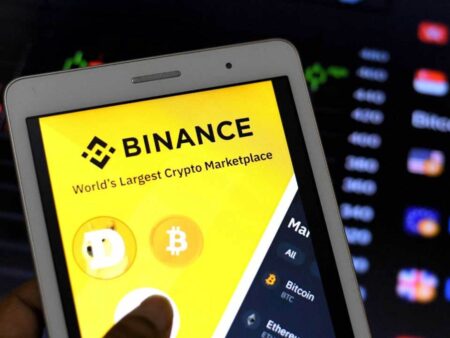Understanding the Current Legal Status of Binance in the US
The legal landscape for cryptocurrency exchanges in the United States is intricate and subject to rapid changes. As of now, Binance, one of the largest cryptocurrency exchanges in the world, has faced numerous regulatory hurdles. While Binance.com is not entirely banned, several elements of its operations have come under scrutiny from various US regulatory bodies. The platform has made efforts to comply with US regulations, leading to the launch of Binance US, a separate entity designed to cater specifically to American users.
Binance US offers a limited selection of cryptocurrencies compared to its global counterpart and is compliant with US regulations. However, many users have reported restrictions in accessing the full range of services available on Binance.com. This situation has cultivated a sense of confusion among users regarding the legality and availability of Binance services in the US.
Moreover, regulatory bodies such as the Securities and Exchange Commission (SEC) and the Commodity Futures Trading Commission (CFTC) have voiced concerns regarding Binance’s operations. These agencies have initiated investigations that could lead to enforcement actions against the exchange. Consequently, understanding the current legal status of Binance involves navigating both the actions of federal regulators and the responses from the exchange itself.
The detail surrounding Binance’s legal status is further complicated by the dynamic nature of cryptocurrency regulations. Different states have varying laws and guidelines regarding cryptocurrencies, leading to a patchwork of regulations that can affect how Binance operates in different regions of the US.
Overall, while Binance has not been outright banned, the ongoing scrutiny and legal challenges create a precarious situation for its operations in the US. Users are advised to stay informed about developments concerning the exchange, as the landscape can change rapidly.
In summary, the question of whether Binance is banned in the US does not have a simple answer. The exchange is operational but faces significant regulatory challenges that could impact its services and user access in the near future.
Key Reasons Behind Binance’s Regulatory Challenges
Several factors have contributed to the regulatory challenges faced by Binance in the US. First and foremost is the perception of Binance as a global entity that operates outside of the established regulatory framework. Since its inception, Binance has prioritized global expansion and innovation, sometimes at the expense of regulatory adherence in specific jurisdictions, particularly the US.
Another significant issue is the lack of registration and licensing with the relevant US authorities. Unlike traditional financial institutions, many cryptocurrency exchanges, including Binance, have not registered as securities exchanges or broker-dealers. This has raised red flags for regulators who are concerned about consumer protection and market integrity.
Moreover, Binance has faced accusations of facilitating trading in unregistered securities. The SEC and CFTC have focused on identifying tokens traded on the platform that may qualify as securities, which would require Binance to comply with stringent regulatory standards. The ambiguity surrounding the classification of various cryptocurrencies further complicates this issue, making it difficult for exchanges to navigate the regulatory landscape.
Additionally, Binance has been criticized for its perceived lack of transparency regarding operational practices, security measures, and user data protection. Regulators are increasingly demanding higher standards of compliance, leading to concerns that Binance may not meet the rigorous requirements necessary to operate legally within the US.
The issue of anti-money laundering (AML) and know-your-customer (KYC) protocols is paramount as well. Regulatory bodies have raised concerns that Binance’s KYC procedures may not be robust enough to prevent illicit activity on its platform. This has heightened scrutiny and led to calls for more stringent compliance measures.
Lastly, the evolving nature of cryptocurrency regulation means that exchanges must constantly adapt to new laws and guidelines. As the regulatory environment becomes more complex and stringent, the challenges faced by Binance and similar exchanges will likely intensify.
A Closer Look at Binance’s Compliance Efforts
In light of the regulatory challenges it faces in the US, Binance has taken several steps to enhance its compliance efforts. One significant move was the establishment of Binance US, aimed at providing a compliant platform that adheres to US laws and regulations. By creating a separate entity, Binance has attempted to distance itself from some of the concerns associated with its global operations.
Binance has also invested heavily in compliance technology and hiring experienced professionals in regulatory compliance. The exchange has sought to develop a robust KYC process that aligns with US regulations, aiming to build trust with regulators and users alike. This includes implementing identity verification protocols and transaction monitoring systems to detect suspicious activities.
The exchange has also engaged in discussions with US regulators to better understand their concerns and expectations. By fostering open lines of communication, Binance aims to demonstrate its commitment to regulatory compliance while advocating for a more balanced regulatory framework for cryptocurrencies.
Moreover, Binance has been proactive in delisting certain tokens that may be considered securities. In an effort to align its offerings with regulatory guidelines, the exchange has periodically reviewed its listed assets to ensure compliance with applicable laws. This strategy aims to minimize the risk of enforcement actions against the platform.
Despite these efforts, challenges remain. Regulatory agencies continue to scrutinize Binance’s practices, and the exchange must stay vigilant in adapting to changing regulations. The company’s ability to navigate this complex landscape will be essential for its continued operation in the US market.
In conclusion, while Binance has made substantial efforts to improve its compliance frameworks, ongoing uncertainties and regulatory scrutiny will likely shape its operations in the foreseeable future.
Impact of US Regulations on Binance’s Operations
The impact of US regulations on Binance’s operations is profound and multifaceted. Regulatory uncertainty has led Binance to reevaluate its business model in the US market. This reevaluation includes the introduction of Binance US, which offers a limited range of products to comply with local laws, resulting in a diminished user experience for American clients.
Moreover, the legal challenges that Binance faces have affected its ability to attract institutional investors. Many potential institutional clients require assurances regarding regulatory compliance and risk management. As a result, Binance’s reputation has been impacted, potentially deterring significant investments from larger players in the market.
The ongoing investigations by the SEC and CFTC have created an environment of uncertainty that could lead to further restrictions on Binance’s operations. Depending on the outcome of these investigations, the exchange may need to make additional changes to its business model, including further limiting available trading pairs and services.
Additionally, compliance with US regulations often requires considerable financial investment. Binance must allocate significant resources to implement robust compliance systems, which may divert funds from other areas such as development and marketing. This could inhibit the platform’s ability to compete effectively with other exchanges that are not facing similar regulatory scrutiny.
The regulatory environment has also prompted Binance to enhance its communication with users. The exchange has taken steps to address user concerns and improve transparency regarding its compliance measures. Maintaining user trust is crucial, especially during turbulent regulatory times.
Lastly, US regulations have catalyzed a broader discussion on the future of cryptocurrency regulation. As regulators increasingly focus on the crypto space, Binance’s experience may serve as a case study for how other exchanges navigate similar challenges. The outcomes of ongoing investigations will likely shape regulatory approaches and industry standards going forward.

User Experiences: Accessing Binance from the US
For users in the US, accessing Binance presents a mixed bag of experiences. While many have successfully utilized Binance US, the range of cryptocurrencies and trading features available is limited compared to its global counterpart. This has led to frustration among users who wish to access a wider variety of digital assets.
Some users have reported difficulties in transferring funds between Binance US and other wallets or exchanges. The need for compliance with KYC and AML regulations may result in longer verification processes, which can be inconvenient for those wishing to trade swiftly. This has raised concerns that US regulations may inadvertently stifle user engagement in the crypto space.
Conversely, many users appreciate the enhanced security measures that Binance US claims to enforce. By adhering to US regulations, Binance US aims to create a safer trading environment, which may attract users concerned about potential fraud or security breaches associated with unregulated exchanges.
Additionally, the user interface and customer support experiences on Binance US have received mixed reviews. While some users find the platform intuitive and user-friendly, others have expressed dissatisfaction with customer service response times. The limited selection of cryptocurrencies has also led many to seek alternative exchanges that offer a more extensive range of trading options.
In a bid to enhance user experience, Binance US has actively engaged with its user base, seeking feedback to improve services. This responsiveness may help bolster user trust and satisfaction over time, even as it navigates the complexities of regulatory compliance.
In summary, while accessing Binance from the US is possible, users often find themselves navigating a compromised experience due to regulatory limitations and compliance measures. As regulations evolve, so too may the user experience on platforms like Binance US.
Future Outlook: What Lies Ahead for Binance in America
The future outlook for Binance in America is uncertain, marked by regulatory scrutiny and the evolving cryptocurrency landscape. As US regulators continue to crack down on various aspects of the cryptocurrency market, Binance will need to maintain a proactive approach to compliance and user engagement.
The establishment of Binance US has allowed the exchange to continue operating in the US, but the limited offerings may not suffice in retaining a competitive edge. As more exchanges emerge, Binance will have to innovate to retain its user base while adhering to stringent regulations. This could involve expanding its services, enhancing its compliance practices, and improving the overall user experience.
Moreover, the outcomes of ongoing investigations could significantly affect Binance’s operations in the US. If regulators deem certain practices illicit, Binance may be forced to make drastic changes, which could impact user access to various cryptocurrencies and trading features.
As discussions surrounding cryptocurrency regulation progress, Binance may find itself at the forefront of advocacy for a more balanced regulatory framework. Engaging with policymakers to shape future regulations could be crucial for the exchange’s sustainability in the US market.
| Aspect | Binance Global | Binance.US | Alternative Exchanges |
|---|---|---|---|
| Regulatory Status | Restricted in the US | Complies with US laws | Varies by exchange |
| Available Services | Full range of features | Limited services | Depends on platform |
| User Access | Not available to US users | Available in most states | Varies by region |
Furthermore, as the cryptocurrency landscape matures, user expectations will evolve. Binance must remain adaptable and responsive to changes in user preferences, especially as competition intensifies. Building trust through transparency and robust security measures will be essential for maintaining its market position.
In conclusion, the future of Binance in America is contingent upon its ability to navigate regulatory challenges while providing a compelling user experience. The next few years will be critical in shaping the exchange











I didn’t know Binance had so many issues in the US. Interesting read!
Binance US seems to have a lot less options than the global platform.
The legal stuff around Binance sounds complex, but important to know.
I didn’t realize the SEC and CFTC were so involved with Binance’s operations.
It’s confusing how Binance is operating in the US with all these regulations.
“Binance’s efforts to comply with US laws are interesting, hope it works out.”